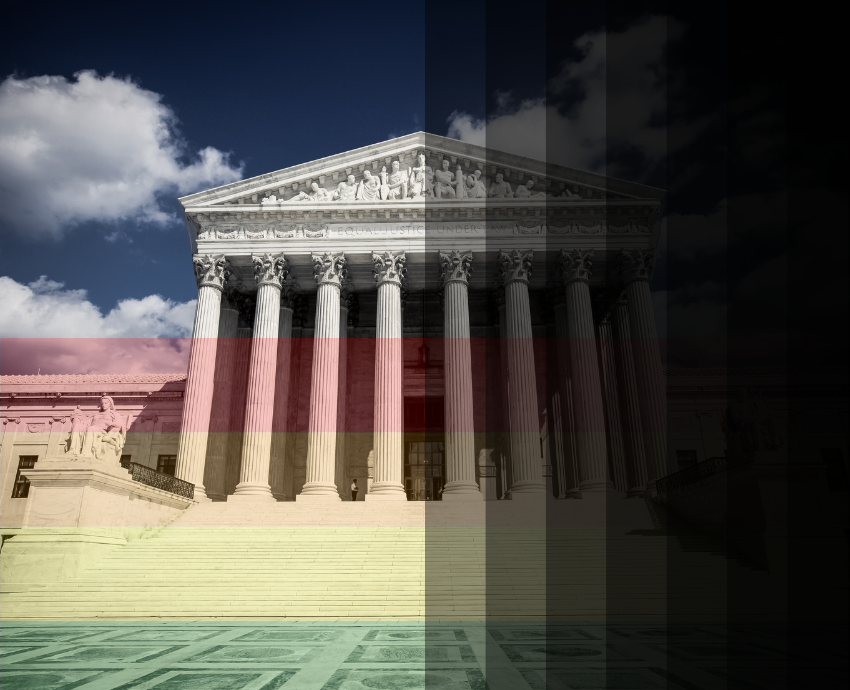
The United States Supreme Court majority issued four reactionary decisions on June 30 – its final day in session.
In addition to ending affirmative action in college admissions and upholding voter restrictions in Mississippi, the Court curtailed LGBTQ rights and struck down debt relief for students burdened with higher education tuition loans.
The New York Times reported that the Court sided with web designer Lorie Smith, in her refusal to design wedding websites for same-sex couples, despite a Colorado state law that forbids discrimination against LGBTQ people.
“The case, though framed as a clash between free speech and gay rights, was the latest in a series of decisions in favor of religious people and groups, notably conservative Christians.
“The decision also appeared to suggest that the rights of LGBTQ people, including to same-sex marriage, are on more vulnerable legal footing, particularly when they are at odds with claims of religious freedom. At the same time, the ruling limited the ability of governments to enforce anti-discrimination laws.”
The six reactionary justices who make up the Court’s majority “saw the decision as a victory that safeguarded the First Amendment right of artists to express themselves”, wrote the NYT. “The liberal justices viewed it as something else entirely — a dispute that threatened societal protections for gay rights and rolled back some recent progress.”
Dissenting justice, Sonia Sotomayor, “warned that the outcome signaled a return to a time when people of color and other minority groups faced open discrimination”.
Smith filed the lawsuit in 2016, with the backing of the right-wing Alliance Defending Freedom (ADF), a Christian group attempting to roll back the rights of LGBTQ people. Her lawsuit was rebuffed by lower courts.
According to media reports, it turns out that Smith hasn’t made any marriage websites since she filed the suit, and the whole affair appears to have been an ADF concoction designed to get a Supreme Court decision.
“Smith, who has said her Christian faith requires her to turn away same-sex couples seeking website design services, has not yet begun her wedding business,” wrote the NYT. “Nor has she posted a proposed statement on her current website about her policy and beliefs for fear, she has said, of running afoul of the law.
“So, she sued to challenge it, saying it violated her rights to free speech and the free exercise of religion.”
The decision, which came at the end of Pride month, could pave the way for other businesses to turn away LGBTQ customers.
LGBTQ rights groups see the ruling as the opening shot to reverse gay marriage and anti-discrimination laws and practices across the country. Activists pledged to press by all methods to protect their community.
Student debt relief denied
In another ruling, the Supreme Court majority struck down a decision by President Joe Biden to provide debt relief to 40 million students owing large debts to the government for college and university tuition loans.
The NYT said the Court ruled on June 30 that the Biden administration had “overstepped its authority with its plan to wipe more than $400 billion in student debt, dashing the hopes of tens of millions of borrowers and imposing new restrictions on presidential power”.
President Donald Trump declared in March 2020 that the COVID-19 pandemic was a national emergency. He paused student loan repayment requirements and suspended the accrual of interest, in light of the pandemic’s severe economic impact. The Biden administration followed suit.
In August 2022, the administration said it planned to end the repayment pause but would forgive $10,000 in dept for individuals earning less than $125,000 a year (or $250,000 a year per household) and would wipe $20,000 in debt for those who received low-income grants for families.
The Court’s ruling on student debt fits a pattern. Last June, the Court curtailed the Environmental Protection Agency’s power to address climate change. It also ruled that the Centers for Disease Control and Prevention was not authorised to impose a moratorium on evictions, and the Occupational Safety and Health Administration was not authorised to tell large employers to have their workers vaccinated against COVID-19, or undergo frequent testing during the pandemic.
In dissenting the Court’s decision, Justice Elena Kagan said that the decision to side with the six Republican states that sued to block the plan was opportunistic, unprincipled and infected by politics.
The Court majority even invented an “injured party” in order to hear the suit. The so-called injured party was the Missouri Higher Education Loan Authority that administers the day-to-day operations on the loans. Supposedly, it would be harmed by losing a number of student loans to service, and it would ostensibly owe the state money.
The Authority was not consulted about this, and was unwittingly drawn into the case.
Since the Authority is part of the state government, the argument went, Missouri is also an “injured party”.
But the loan fund that the Authority administers hasn’t paid anything on it to the state of Missouri in the last 15 years, and internal documents showed that it has no intention of paying anything to the state.
“From the first page to the last,” Kagan wrote, “today’s opinion departs from the demands of judicial restraint. At the behest of a party that has suffered no injury, the majority decides a contested public policy issue properly belonging to the politically accountable branches and the people they represent.”
Compare this to the refusal of the Court to even hear a challenge to Mississippi’s constitutional clause used to deny Black voting rights.
Kagan’s dissent, joined by Justices Sonia Sotomayor and Ketanji Brown Jackson called the Court’s ruling a way to amplify the court’s power.
“The question, the majority helpfully tells us, is ‘who has the authority’ to make such calls,” Kagan wrote. “The answer, as is now becoming commonplace, is this Court.”
Six unelected people now impose their right-wing views on all of us.